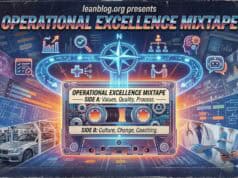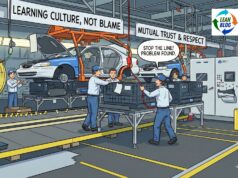CNN Programs – Anchors/Reporters – Sanjay Gupta
I had a very full, interesting week – giving a well-received talk about Lean Healthcare at the Ontario Hospital Association convention, spending a day with a hospital east of Toronto, and hearing some thought provoking speakers in Toronto and back in Cambridge.
- CNN's Dr. Sanjay Gupta (subject of this blog post)
- Michael Moore (I'll leave that alone other than to say his talk titled “Healthcare Possibilities” wasn't nearly as optimistic as the title — no surprise)
- Former Speaker Newt Gingrich (who I'll blog about soon)
- At MIT, “Lean Startups” guy Eric Ries (who I'll also blog about)
I had a chance to say hi to Dr. Gupta – we're both from Michigan and he lived for a few years in my hometown of Livonia. He seems like a genuinely nice person – surprising for a major TV personality and, as someone else said, surprising for a Neurosurgeon (that's a mean comment).
 Dr. Gupta didn't talk about Lean, of course, and I'm not sure if he's familiar with the notion, but some of this stories made me think of Lean.
Dr. Gupta didn't talk about Lean, of course, and I'm not sure if he's familiar with the notion, but some of this stories made me think of Lean.
He talked about how the military learned a lesson in the first Gulf War — it was taking too long to get patients moved to get care. So their countermeasure (my term, not his) for the most recent war was to have “quick setup” tents (his term) that could be set up in about two hours right at the point of injury or the point of combat, if you will.
This meant soldiers could be stabilized more quickly, but also raised the moral and ethical dilemma of putting medical teams in harm's way.
Dr. Gupta also described how he might get pulled away at a moment's notice to go cover a tragedy or medical emergency, or some other urgent trip. Rather than complaining that “every trip is different, I can't possibly plan” (as we hear sometimes in healthcare, related to patients), he plans for LIKELY occurrences.
He has a bag at home for each of these, packed and ready to go:
- Cold weather disaster
- Warm weather disaster
- Interviewing the President or foreign dignitary
He might not know exactly what trip is coming, but he's ready and prepared to go. Sounds Lean.
Dr. Gupta also talked about a Japanese term “Ikigai.” This means “sense of purpose.” He said that people live longer when they have this sense of purpose, a reason for getting out of bed in the morning. To expand on that, I'll say it's an important lesson, that everybody should be able to have “pride in work” (as Dr. Deming would say) during their working life. People in healthcare have a very strong sense of ikigai, so we can tap into that intrinsic motivation to help lead change.
He was asked about the idea of a “fat tax” on fast food as a way to pay for healthcare and to incentivize good eating habits. Dr. Gupta said he thought that wasn't getting to the “root cause” and wouldn't solve obesity — it would be punishing the poor and making it more difficult to feed their families.
Final story – he talked about CPR and how people are often very uncomfortable doing mouth to mouth on a stranger. Researchers looked for a countermeasure rather than just blaming people for being bad. The research showed that doing JUST chest compressions was just as good as the old style CPR of compressions and mouth to mouth — not only was it just as good, it works BETTER.
That's a great example of using medical evidence and data to prompt “kaizen” or a change in the old standardized work. Why do we do mouth to mouth? We've always done it that way… but we don't have to. Time to get new CPR training.
I'd like to thank Dr. Gupta for his inspirational talk. Michael Moore, not so much.
Subscribe via RSS | Lean Blog Main Page | Podcast | Twitter @markgraban
If you’re working to build a culture where people feel safe to speak up, solve problems, and improve every day, I’d be glad to help. Let’s talk about how to strengthen Psychological Safety and Continuous Improvement in your organization.









Just a side note… I believe, but am not sure, that President Obama originally offered the Surgeon General position to Dr. Gupta, but he declined. Given his added dimension of intuitive Lean thinking, he might have been very good.
Sanjay Gupta was offered the position of U.S. Surgeon General by President Obama, but declined because the Surgeon General doesn't get to do any actual surgery and Dr. Gupta wanted to continue to practice neurosurgery. That and the cut in pay. The Surgeon General makes about $153,000 per year. Dr. Gupta makes considerably more than that at CNN. He reportedly also makes between $30,000 and $50,000 for each speaking engagement he does.
I would like to know what proposals he has that do strike at the root cause. Many people see the current food system is designed in a way that makes fatty foods cheap, which would seem the opposite of what you would want in a systemic solution. Don't subsidize things that add to the problem.MIT suggests a system in need of lean thinking – locally produced food. http://web.mit.edu/newsoffice/2009/foodshed.html